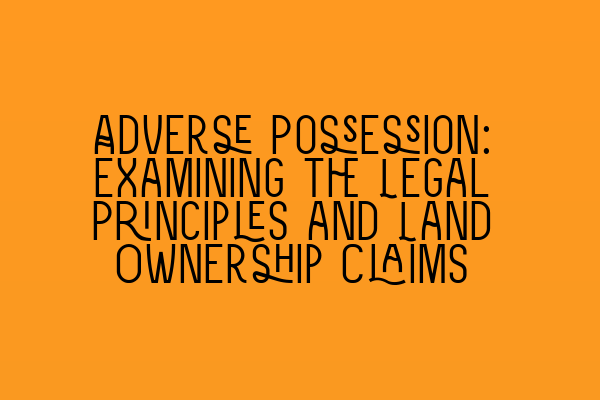Adverse Possession: Examining the Legal Principles and Land Ownership Claims
When it comes to property law and land ownership, one concept that frequently surfaces is adverse possession. Adverse possession refers to the legal principle that allows an individual to claim ownership of someone else’s land if they have occupied it openly, continuously, and without permission for a specified period of time. In this blog post, we will delve into the intricacies of adverse possession, exploring the legal principles behind it and the claims it entails.
The Legal Principles of Adverse Possession
Adverse possession is based on the idea that if someone occupies a piece of land for an extended period, treating it as their own, and the legal owner fails to take action to remove them, their claim to the land should be accepted. However, there are certain key criteria that must be met for adverse possession to be successfully claimed:
1. Actual Possession
For adverse possession to be established, the claimant must demonstrate that they have physically occupied and controlled the land as if they were the rightful owner. This involves using the land openly and exclusively, excluding the true owner from accessing or using it.
2. Hostile Possession
The occupation of the land must be hostile, meaning that it is without the permission or consent of the legal owner. However, it’s important to note that hostility in this context does not refer to ill feelings or animosity but rather to the lack of permission.
3. Continuous Possession
The possession of the land must be continuous, without any significant breaks or interruptions. This means that the claimant must provide evidence to show that they have consistently occupied the land over a specific period of time, often ranging from 10 to 12 years.
4. Open and Notorious Possession
The claimant must demonstrate that their occupation of the land is open and notorious, meaning that it is readily noticeable to anyone with a reasonable level of observation. Their possession should be such that it would put the true owner on notice of their claim.
5. Exclusive Possession
The claimant must show that their possession of the land is exclusive, meaning that they have sole control over the property and that no one else is concurrently occupying it.
Land Ownership Claims and Adverse Possession
Adverse possession can result in significant disputes over land ownership. In many cases, the true owner may not be aware of the occupation until the adverse possessor makes a claim. Once a claim is made, the legal owner must take action to challenge the claim within a specific timeframe.
To undermine a claim for adverse possession, the legal owner may attempt to prove that one or more of the key criteria discussed earlier are not fulfilled. For example, they may argue that the occupation was not continuous or that the claimant did not possess the land exclusively.
Ultimately, the burden of proof rests on the claimant to establish their right to adverse possession. They must provide sufficient evidence to demonstrate that they have met all the necessary requirements and that they have acquired ownership of the land through adverse possession.
If a claim for adverse possession is successful, the legal owner loses their right to the land, and the adverse possessor becomes the new registered owner. This highlights the potential consequences of failing to take prompt action against someone who is occupying your land without permission.
Conclusion
Adverse possession is a complex area of property law that involves the legal principle of acquiring someone else’s land through occupation and continued use over an extended period. To successfully claim adverse possession, the claimant must meet specific criteria such as actual possession, hostility, continuous possession, open and notorious possession, and exclusive possession.
If you are involved in a dispute over land ownership or need legal advice regarding adverse possession, it is crucial to consult with a reliable property law solicitor. At SQE Property Law & Land Law, our team of experienced solicitors can provide expert guidance and representation to help protect your interests.
For further information on related topics, we recommend checking out the following articles:
